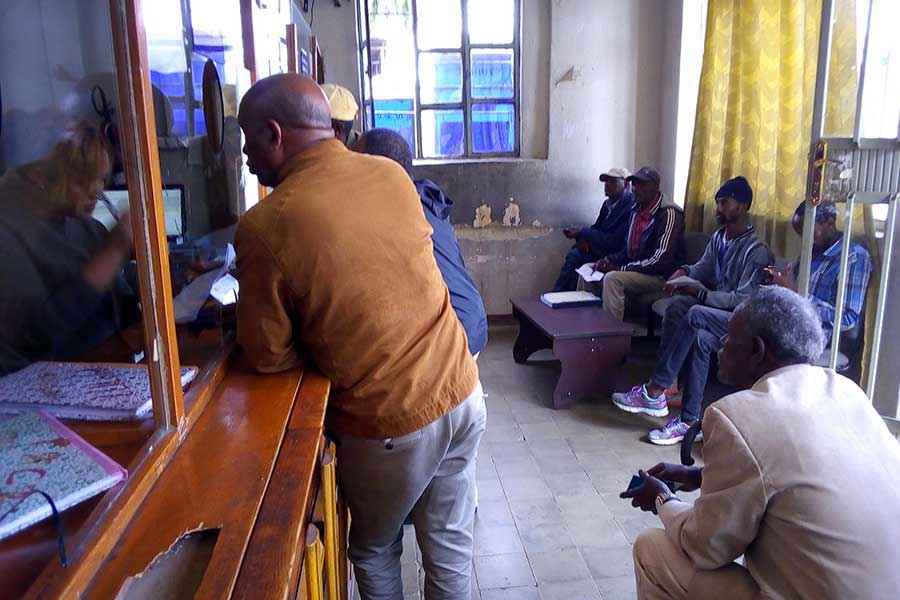
Radar | Jan 03,2021
Feb 22 , 2020
By SEBLE WONDEMAGEGN ( FORTUNE STAFF WRITER )
The system also shows performances of higher education institutions.
The government is set to launch an electronic information system that details the performance of higher education institutions and the academic background of students.
Known as the Higher Education Information Management System (HEIMS), the web-based platform provides information about graduates and higher education institutions for government and private institutions. The system can also identify those who do not have valid academic credentials.
Developed by a team of 16 experts from the Technology & Innovation Institute over the past 10 months, the system will be managed by the Higher Education Relevance & Quality Agency. Established in 2003, the agency is in charge of regulatory activities including accreditation and re-accreditation of programmes in higher education institutions.
Reaching its completion stage, the system will provide its manual services in a digital format. The Agency will be tasked with providing accreditation and re-accreditation services and regulating campus expansions, programme expansions and student enrollment size.
After the system becomes operational, the Agency, which recently banned 22 campuses for not having legal business licenses, will pilot the programme by responding to the institution's requests.
The academic credentials of the past 22 years will be available on the database and provide information on the legality of documents, according to Andualem Admassie (PhD), director-general of the Agency.
The system will open only to higher education institutions in a week and will be open to the public within a year.
"After we discuss the measures that will be taken against individuals without real credentials with the government,” said Andualem, "we'll make it available for the general public."
Dawit Asrat (PhD), a lecturer at Bahir Dar University’s College of Education & Behavioural Sciences, says the system will play a significant role in reducing the prevalence of fake documents.
"But, it's too late," he said. "The Agency should open the system soon after making a decision on the fate of the people with false credentials."
The President of Debre Tabor University, Anegagregn Gashaw, says that digitising the system will help institutions of higher education exchange the latest information.
"But disclosing the system to the public might cause a problem," he said. “It should be an urgent matter for the government to take prompt action to give the public access to the system as soon as possible, though it should be careful and consult with all the concerned parties before going public.”
After the system becomes operational, the Agency will give the institutions a username and password to access the system after each school has fulfilled the required criteria, demonstrating that they are legally licensed and have hired qualified academic staff.
Both public and private higher education institutions can report data to the Agency through the system. They can access services by logging into the system and printing out the necessary forms. If there is any payment required, they will be able to make the payments through the banks to the agency's account.
The system will save time and effort. Anyone can search for the details of an institution before choosing where they want to study, according to Salman Mohammed, director for information systems and infrastructure division at the Technology & Innovation Institute.
Besides providing information to the institutions, the system will help government officials easily access data on higher education institutions and their operations.
The country has 50 public universities, and there were 873,000 students studying for their first degrees during the last academic year. There are also 38 teacher education colleges throughout the country that provide a three-year diploma in teaching through regular, summer and extension programmes.
For this fiscal year, the country allocated 50.6 billion Br, 13pc of its total budget, for education.
PUBLISHED ON
Feb 22,2020 [ VOL
20 , NO
1034]

Radar | Jan 03,2021

Radar | Mar 16,2019

My Opinion | Jan 03,2021

Fortune News | Mar 20,2021

Addis Fortune | May 07,2022

Radar | Feb 09,2019

Radar | Apr 30,2021

Radar | Dec 12,2020

Radar | Dec 19,2018

Fortune News | Jun 27,2020

Dec 22 , 2024 . By TIZITA SHEWAFERAW
Charged with transforming colossal state-owned enterprises into modern and competitiv...

Aug 18 , 2024 . By AKSAH ITALO
Although predictable Yonas Zerihun's job in the ride-hailing service is not immune to...

Jul 28 , 2024 . By TIZITA SHEWAFERAW
Unhabitual, perhaps too many, Samuel Gebreyohannes, 38, used to occasionally enjoy a couple of beers at breakfast. However, he recently swit...

Jul 13 , 2024 . By AKSAH ITALO
Investors who rely on tractors, trucks, and field vehicles for commuting, transporting commodities, and f...

Oct 18 , 2025
The political establishment, notably the ruling party and its top brass, has become p...

Oct 11 , 2025
Ladislas Farago, a roving Associated Press (AP) correspondent, arrived in Ethiopia in...

Oct 4 , 2025
Eyob Tekalegn (PhD) had been in the Governor's chair for only weeks when, on Septembe...

Sep 27 , 2025
Four years into an experiment with “shock therapy” in education, the national moo...